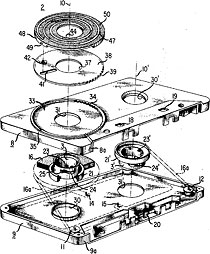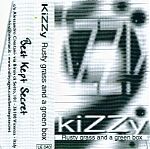Best Kept Secret
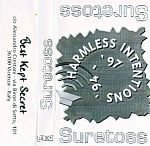
Suretoss was the first tape released on Alessandro Crestani’s Italian, Best Kept Secret label and was from American artist, Chris McFarlane from Santa Cruz, CA.
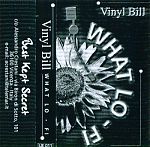
Best Kept Secret released high quality indie dream pop and rock with handsomely designed and executed , professional looking covers. Above, a 1998 cassette from the duo known as Vinyl Bill, Shawn J. and Neil Scollay.
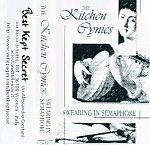
From Scotland, the home recording project of Alan Davidson was called The Kitchen Cynics. A wonderful, psychedelic sounding acoustic songs tape.
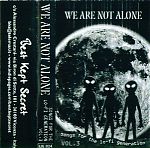
Best Kept Secret released many fine compilation tapes that included international artists. The one above featured Anthony DiStefano, Michael J. Hex, Activity Set, Girlinky, myself and several others.
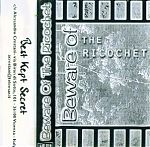
Volume One ( of three) of the compilation, “Beware Of The Ricochet” . This one had Gary K, Mugwump, Idiot Box, Moonbabies, Mothburner and many more.
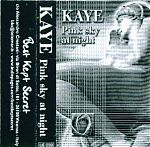
Best Kept Secret had a good representation of women artists in groups and also as solo artists. Above, a gorgeous dreampop outing by Kaye. And below, a cassette by an artist named Kizzy. Both were artists I have not heard from before or since. Too bad because they are wonderful tapes.
Interview with Alessandro Crestani
What years did Best Kept Secret operate?
The label started in early Spring of 1998 and ceased operations at the beginning of 2010, lasting a bit less than twelve years.
What gave you the idea to start a tape label?
I’ve been listening to music ever since the early Eighties and have a little bit of experience in music journalism. At some I decided that I wanted (or, now looking back on it, felt the need) to do something with music other than just listening or writing about it. At that point I had just started digging into the world of tape labels (which, until that moment, I had rather presumptuously ignored) and, since I just did not have the financial capabilities to start a proper label, I opted for a cassette label.
Are you a musician yourself? What type of music did you hear growing up that influenced you?
I am not a musician myself. As for the music I grew up listening to, it is quite a mixed bag and ranges from late Seventies American New Wave (The Cars eponymous first album is an all-time favourite of mine), to British post-punk (which then led to my developing a passion for dreampop, shoegaze and post-rock) and to some early Eighties synth-pop (Human League, Heaven 17, early Depeche Mode) and even some of the mainstream so-called New Romantic stuff.
In the late 1990s everyone seemed to be going to CDs/CDRs and yet you kept going with cassettes. And now they are back in vogue. It seems you were ahead of your time. Did you ever consider a CDR label?
Like I just mentioned, the choice of the format was at first dictated by financial issues. As years went by, from time to time it did occur to me to consider switching to a different one, such as cd-r’s, but in the end I came to the conclusion that it would not make much sense, as they are not proper cd’s and, a such, would never find any better channel of distribution than cassettes. Plus, unlike cd-r’s, tapes give me a pleasant warm and fuzzy feeling inside. Nothing like vinyl, of course, but something along those lines, if you can see what I mean.
You had a wide variety of music on BKS. How would a band or artist get a tape released on your label? Did you ever specifically ask for a new release?
I have always done my best (and believe I have succeeded in doing so) to prevent Best Kept Secret from having a label sound, because it would just make things boring. I mean, once you picked up the first, say, three releases, you would already know what the next fifty would sound like.
I have always only released the music that I liked; not on a genre-based but rather on a song-by-song evaluation, though. Sometimes I happened to come across songs that kind of appeal to me although they’re a genre that is not really up my alley and that I usually do not listen to. Therefore, when it came to putting together compilations, I did not mind exploring different territories I am not that familiar with.
Most of the times bands/artists got in touch with me first and I did get the chance to put out all-new material, though the license had a time limit.
Were you in touch with any underground label heads like Matthias Lang of IRRE, Kim Harten of Bliss, or the Italian labels like Old Europa Café? Did you get any advice from them?
Bliss was the first label I purchased cassettes from and Kim Harten was definitely a source of inspiration and I am sorry I never got the chance to meet her in person to express my gratitude.
How did you distribute your products? Was there any advertising at all? Any placement in any zines?
I only advertised once on an Italian paper magazine which is no longer, and it wasn’t fun, because in the following months the folks at their marketing dept kept hassling me with phone calls trying to talk me into placing more ads with them…Reviews on fanzines and webzines were the main means of promotion, and actually worked quite well, until paper fanzines disappeared and web magazine and fanzines stopped review music on the cassette format (the reason for which still lies beyond my comprehension).
What were some of your personal favorites on BKS?
Kind of hard for me to say. Every tape has a story of its own that makes it unique in its own way. For instance, the Suretoss tape is of a particular significance to me, being the cassette that started it all; Vinyl Bill’s “Too lazy to rock” is the first tape by the first band I had never heard of before to get in touch with me; I am proud to have a Kitchen Cynics tape, because Alan Davidson is the first hometaping artist I have grown mad about after I began looking into the world of d.i.y. cassettes; “Broken bits of you and me” is the very first compilation (also with the best piece of artwork my friend Silvia has come up with so far – she always does a great job, but this one really gave me the chills when I saw it for the first time). And I could go on. Then there were the Moonbabies, who a few years later got signed to the great Parasol label out of Urbana, Il and Skywave went on to become A Place To Bury Strangers…. I guess you can see what my point is here.
You also produced compilation tapes with many international artists. How did you make the selections for each tape? Were they simply favorite songs from a tape you already distributed? How did bands find you? Or did you find them?
Compilation tapes usually featured songs that had not before appeared on other releases. That of putting together compilations was a long, and often excruciating process and I eventually gave up on it. Most of the times it was the bands who got in touch with me, but sometimes things worked the other way around as well.
You seemed to mainly release odd pop and indie rock material. Did you ever release noise or hard core experimental? Was there a philosophy behind the label?
I have always done my best (and believe I have succeeded in doing so) to prevent Best Kept Secret from having a label sound, because it would just make things boring. I mean, once you picked up the first, say, three releases, you would already know what the next fifty would sound like.
I have always only released the music that I liked; not on a genre-based but rather on a song-by-song evaluation, though. Sometimes I happened to come across songs that kind of appeal to me although they’re a genre that is not really up my alley and that I usually do not listen to. Therefore, when it came to putting together compilations, I did not mind exploring different territories I am not that familiar with.
Did you meet any of the acts you worked with?
Some of them I did, in the U.S. and in the U.K.
You continued into the 21st century with your label. Did you ever consider switching to a “net label”?
No, never. Not sure why this is (it may well that I am technophobic), but that of “net label” is a concept which I can’t come to terms with.
What reason finally ended Best Kept Secret?
I had always thought the progress of technology would be the factor that would eventually kick me out of the game, but, instead (and much to my regret), it was the lack of spare time due to my full-time day job. When you end up spending up to ten-eleven hours a day in the office, there is not mu time left for anything else.
Are there things you wished you would have done differently? Any goals you wanted to achieve that eluded you?
Not really. Starting the labels was probably the smartest thing I have done in my life, something that has widened my horizons and taught me a lot of things, not just about music, but also about myself and dealing with people in general. For once, I have no regrets and strongly believe that I have gone as far as I could go and achieved accomplished anything I could possibly have achieved with a cassette-only label.
What projects interest you now?
Like I said, as of now, in my life there is no time for other project. I miss running the label a great deal already, but, unfortunately, I do not see myself getting started with a new project anytime soon.
Can you compare the underground music community today and the internet with the community of postal exchange before?
I state the obvious by saying that it has radically changed.
I am not quite sure as to whether the dramatic change that has taken place is entirely for the better, though, as the internet has exponentially increased the amount of music that is available to us and I get the feeling that music consumption (so to speak) is becoming more and more superficial, in terms of how deep we dig into what we listen to and how far we are willing to go in order to understand it, compared to what it was like back then.
